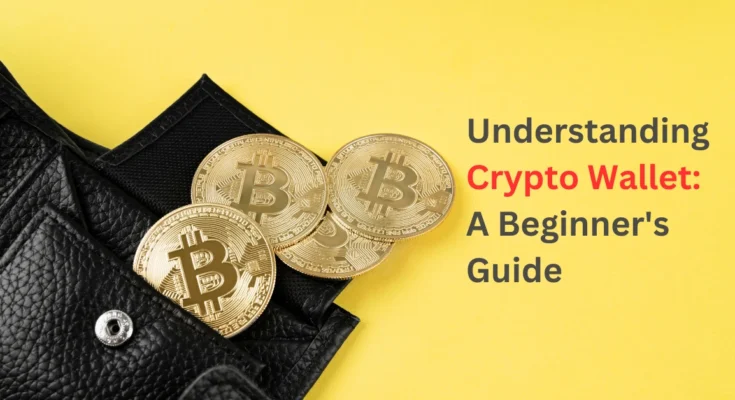If you’re venturing into the world of cryptocurrencies, one of the first things you need to understand is the crypto wallet. It’s your key to securely storing and managing your digital assets. Think of it as your online bank account, but for cryptocurrencies. In this beginner’s guide, we’ll unravel what a crypto wallet is, the different types available, and how to choose the best one for your needs.
With the rise in popularity of cryptocurrencies like Bitcoin, Ethereum, and countless others, knowing how to safely store these digital currencies is crucial. A good crypto wallet not only helps you keep your assets secure but also makes transactions easier. Let’s dive in!
What is a Crypto Wallet?
A crypto wallet is a digital tool that allows you to store, send, and receive cryptocurrencies. Unlike a traditional wallet that holds physical cash, a crypto wallet doesn’t store the actual currency. Instead, it holds the keys—specifically, public and private keys—that enable you to access your cryptocurrency on the blockchain.
Public and Private Keys Explained
- Public Key: This is like your bank account number. You can share it with others so they can send you cryptocurrency. It’s safe to distribute your public key widely.
- Private Key: This is similar to your bank PIN. You must keep it secret, as it allows you to access your funds and make transactions. If someone obtains your private key, they can take control of your wallet.
The Role of the Blockchain
The blockchain is a decentralized digital ledger that records all transactions across a network of computers. When you send or receive cryptocurrency, the transaction is verified and recorded on the blockchain. Your wallet interacts with this network, allowing you to manage your assets seamlessly.
Types of Crypto Wallets
There are several types of crypto wallets, each with its pros and cons. Here’s a breakdown of the most common types:
1. Hot Wallets
Hot wallets are connected to the internet and allow for easy access to your cryptocurrency. They are convenient for frequent transactions but can be more vulnerable to hacks.
- Examples: Mobile wallets (like Trust Wallet), web wallets (like Coinbase), and desktop wallets (like Exodus).
2. Cold Wallets
Cold wallets are offline storage solutions, making them less susceptible to hacking. They are ideal for long-term storage of cryptocurrencies.
- Examples: Hardware wallets (like Ledger Nano S) and paper wallets (where you print your keys on paper).
3. Custodial Wallets
These wallets are managed by third-party services, meaning they store your private keys for you. While this can be convenient, it requires you to trust the service provider.
- Examples: Exchanges like Binance and Kraken offer custodial wallets.
4. Non-Custodial Wallets
With non-custodial wallets, you control your private keys. This gives you full ownership of your cryptocurrencies but also places the responsibility of security entirely on you.
- Examples: Wallets like MetaMask and Electrum.
How Do Crypto Wallets Work?
Understanding how a crypto wallet operates is essential for effective cryptocurrency management. Here’s a simple breakdown:
Sending and Receiving Cryptocurrency
When you want to send cryptocurrency to someone, you need their public key. Here’s the process:
- Open your wallet and select the option to send cryptocurrency.
- Enter the recipient’s public key and the amount you want to send.
- Confirm the transaction.
The transaction is then broadcasted to the blockchain, where it is verified and recorded. The recipient will see the funds appear in their wallet after verification.
Transaction Fees
Every time you send cryptocurrency, you may incur a transaction fee. These fees vary based on network congestion. It’s important to consider these costs when making transactions.
Wallet Interfaces
Most wallets offer user-friendly interfaces, making it easy for beginners to navigate. Whether you’re using a mobile app or a web-based wallet, you’ll find options to check your balance, send and receive funds, and view transaction history.
Choosing the Best Crypto Wallet
With numerous options available, choosing the best crypto wallet for your needs can be challenging. Here are some factors to consider:
1. Security Features
Look for wallets that offer robust security measures, such as two-factor authentication (2FA), multi-signature support, and biometric logins.
2. User Experience
A user-friendly interface is crucial, especially for beginners. The wallet should be easy to navigate and allow for quick transactions.
3. Supported Cryptocurrencies
Ensure the wallet supports the cryptocurrencies you plan to hold. Some wallets specialize in specific coins, while others support a broader range.
4. Backup and Recovery Options
A reliable wallet should have backup and recovery options. This ensures you can regain access to your funds if you lose your device.
5. Community Trust and Reviews
Research user reviews and community feedback to gauge the wallet’s reliability. Look for wallets with positive reputations and a strong user base.
Securing Your Crypto Wallet
Security should be your top priority when dealing with cryptocurrencies. Here are some essential tips to keep your wallet secure:
1. Use Strong Passwords
Always create complex passwords for your wallet. Avoid using easily guessable information like birthdays or common words.
2. Enable Two-Factor Authentication (2FA)
2FA adds an extra layer of security by requiring a second form of verification (like a text message code) when accessing your wallet.
3. Keep Your Private Keys Safe
Never share your private keys with anyone, and avoid storing them digitally. Consider writing them down and keeping them in a safe place.
4. Be Wary of Phishing Attempts
Stay alert for phishing scams that attempt to trick you into revealing your private keys or passwords. Always verify website URLs and communications.
5. Regularly Update Software
If you’re using a software wallet, ensure it’s regularly updated to protect against vulnerabilities.
Common Misconceptions About Crypto Wallets
Despite their growing popularity, there are several misconceptions surrounding crypto wallets. Let’s clear some of them up:
1. “Crypto Wallets Store Cryptocurrency”
As mentioned earlier, wallets do not store actual cryptocurrencies; they store the keys needed to access your assets on the blockchain.
2. “Hot Wallets are Always Unsafe”
While hot wallets are more vulnerable to online threats, many offer excellent security features. They can be safe for regular transactions if used properly.
3. “All Wallets are the Same”
Different wallets serve different purposes. Choosing the right wallet depends on your specific needs—whether you prioritize security, ease of access, or the ability to manage multiple cryptocurrencies.
Frequently Asked Questions
1. What is a crypto wallet?
A crypto wallet is a digital tool that allows you to store, send, and receive cryptocurrencies. It holds the keys to access your assets on the blockchain.
2. How do I choose the best crypto wallet?
Consider factors like security features, user experience, supported cryptocurrencies, backup options, and community trust when choosing a wallet.
3. Are hot wallets safe?
Hot wallets can be safe if used with strong security measures, but they are more vulnerable to online attacks compared to cold wallets.
4. What is the difference between custodial and non-custodial wallets?
Custodial wallets are managed by third-party services that hold your private keys, while non-custodial wallets give you full control over your keys and assets.
5. Can I lose my cryptocurrency?
Yes, if you lose access to your wallet or if someone gains access to your private keys, you can lose your cryptocurrency permanently.
Conclusion
Understanding how a crypto wallet works is crucial for anyone looking to dive into the world of cryptocurrencies. Whether you choose a hot or cold wallet, the right choice can enhance your experience and security in managing digital assets. As you start your cryptocurrency journey, remember to prioritize security and stay informed.
For more information on crypto wallets and other tech insights, check out Mob Technos. Our articles provide valuable resources to enhance your understanding of technology trends.
Ready to take control of your cryptocurrency investments? Explore different wallets and find the best one for you today! Share your thoughts or questions in the comments below—we’d love to hear from you!




